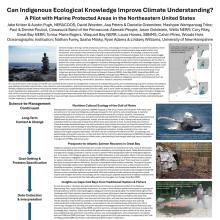Can Indigenous Ecological Knowledge Improve Climate Understanding? A Pilot with Marine Protected Areas in the Northeastern U.S.
Jake
Kritzer
NERACOOS
Poster
Climate change is driving a variety of physical, chemical, and biological changes in coastal and ocean ecosystems, which affect the social, cultural, and economic value of these resources. Many climate impacts are characterized by larger spatial scales, longer timeframes, and complex interconnections among components of the ecosystem. Ocean observing systems typically aim for scale, longevity, and a broad suite of measured variables, but in many cases struggle with the pace and uncertainty of climate impacts. Indigenous Ecological Knowledge (IEK) provides a unique perspective at landscape and seascape scales, across multiple generations, and with a clear eye to interconnectedness, yet too often is absent from ocean science and management systems. We are examining whether and how IEK can complement ocean observing systems to improve understanding of coastal and ocean ecosystems, including climate drivers and impacts, using a network of Marine Protected Areas (MPAs) as study sites. Although these MPAs are a non-Indigenous construct, with boundaries and authorities that are not in line with Indigenous traditions, Indigenous partners nevertheless see them as useful tools for convening, conservation, education, research, and policy innovation. An important early lesson of the project is that IEK can enter the science-to-management process at multiple stages, from goal-setting and problem specification, through data collection and interpretation, to application. At the early stages, Indigenous communities can identify issues and ask questions related to species and habitats with high cultural value that might be overlooked or downplayed by non-Indigenous stakeholders, attention to which can enhance climate-scale understanding. Notably, Indigenous people embrace the tools of western science as complementary to other sources of IEK, and in some case rely heavily on those tools where IEK has been lost due to displacement, depopulation, and theft. Ultimately, this project is revealing valuable roles for IEK and complementarity with western science in enhancing climate understanding and climate-readiness in coastal and ocean management.

Poster file
kritzer-poster.pdf
(2 MB)
